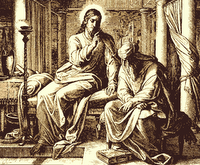Amen
Q: Dear Pastor, what does “amen” mean? It’s said after prayer and also if the pastor says something that sounds good in church.
 A: Amen is a Hebrew word found regularly in the Old Testament. It was often transliterated in the New Testament’s original Greek texts. Stemming from a root meaning of being steady, trustworthy, or firm, and related to words for faithfulness and truth, “amen” means “certainly” or “truly.”
A: Amen is a Hebrew word found regularly in the Old Testament. It was often transliterated in the New Testament’s original Greek texts. Stemming from a root meaning of being steady, trustworthy, or firm, and related to words for faithfulness and truth, “amen” means “certainly” or “truly.”In the Gospels, according to the King James Version, Jesus is quoted as saying, “Verily,” or (in John), “Verily, verily, I say.... (cf. three instances in John 3, et al.)” Later Bibles have used “truly, truly,” or other similar words. What they are translating is, “Amen, amen.” We have no evidence that anyone but Jesus used amen as a preface in this fashion; perhaps He did so to emphasize that the truth of His words needed no ratification from others in order to be completely valid.
Saint Paul would later use amen to talk about Jesus: “For all the promises of God find their Yes in him. That is why it is through him that we utter our Amen to God for his glory. (2 Corinthians 1:20)”
In the Apocalypse, Jesus would use it as a title for Himself: “And to the angel of the church in Laodicea write: ‘The words of the Amen, the faithful and true witness, the beginning of God’s creation.’ (Revelation 3:14)” It is as the Great Amen that Jesus stands knocking at the door of the Christian’s heart as His “faithful and true” testimony invites us to invite Him in (v. 20). Conversely, to deny the truth of His Word is to deny Him who is “the way, and the truth, and the life. (John 14:6)”
 Christians use amen to end prayers as a sign of trust in God. Martin Luther wrote in the Small Catechism that the amen at the end of the Lord’s Prayer means, “I should be certain that these petitions are pleasing to our Father in heaven, and are heard by Him; for He Himself has commanded us to pray in this way and has promised to hear us. Amen, amen, means, ‘yes, yes, it shall be so.’”
Christians use amen to end prayers as a sign of trust in God. Martin Luther wrote in the Small Catechism that the amen at the end of the Lord’s Prayer means, “I should be certain that these petitions are pleasing to our Father in heaven, and are heard by Him; for He Himself has commanded us to pray in this way and has promised to hear us. Amen, amen, means, ‘yes, yes, it shall be so.’”We also use amen when making a confession of faith, as in one of the creeds. The concluding amen says that we agree with a particular statement of belief in God. In keeping with this, when Luther wrote explanations for the three articles of the Apostles’ Creed, he concluded each article’s explanation with an “extended” amen, saying, “This is most certainly true.” Amen is also used as an acceptance of a gift from God, as when we hear a blessing, including the Benediction, from our pastors.
Regarding the second part of your question, while the practice is not common among most of Christendom (including Lutherans, Catholics, and the Orthodox) some churches — especially in American Protestantism — have the tradition of the congregation responding with amens during the sermon. While some people probably do this only out of habit or if the preacher is making them feel good, the root of the practice is in the word’s meaning: The amen should state the people’s agreement with the preaching and with God whose Word is being preached.
Scripture quoted from The Holy Bible, English Standard Version™, © 2001 by Crossway Bibles.
Send email to Ask the Pastor.
Walter Snyder is the pastor of Holy Cross Lutheran Church, Emma, Missouri and coauthor of the book What Do Lutherans Believe.
Technorati Tags: amen | prayer | Lord’s Prayer | Our Father | yes | Apostles’ Creed | truth | Martin Luther | Small Catechism | sermon | preaching | verily

1 Comments:
I miss the "Amens" at the end of the hymns in The Lutheran Hymnal! In fact, I miss The Lutheran Hymnal period, especially the scriptural references! Thank you for your informative and encouraging post! Your blog is a blessing to me!
By the way, Scottius Maximus Jr. and I were pretty close to your town when we were traveling to visit my family out West last week!:) I didn't know that this was your town until today!
Post a Comment
<< Home